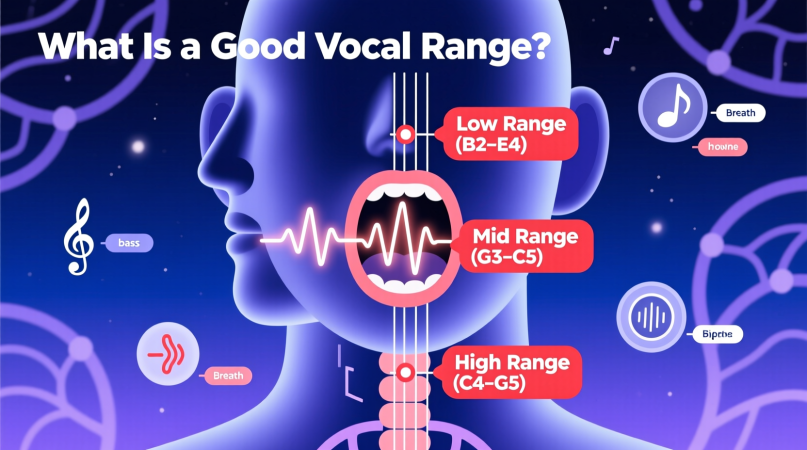
A good vocal range isn’t about who can sing the most notes. It’s about having a span of notes you can use comfortably, consistently, and musically. Most untrained singers cover about 1.5 to 2 octaves, while trained singers often reach 2.5 to 3 octaves. Anything beyond that is exceptional, but even a modest range can be powerful if it’s well-controlled.
Understanding Vocal Range
Your vocal range is the distance between the lowest and highest notes you can sing clearly. But singers don’t live at the edges of their range. What matters most is your tessitura—the part of your range where your voice feels natural and expressive.
A singer with two octaves they can use beautifully is more versatile than someone who squeaks through four octaves without control.
Before picking songs, use a free vocal range checker to find the right fit for your voice.
Typical Vocal Ranges by Voice Type
Here’s what’s common across classical categories:
| Voice Type | Typical Range (approx.) |
|---|---|
| Soprano | C4 – C6 |
| Mezzo-Soprano | A3 – A5 |
| Alto / Contralto | F3 – E5 |
| Tenor | B2 – A4 |
| Baritone | G2 – G4 |
| Bass | E2 – E4 |
👉 Most people naturally fall between 1.5 and 2 octaves, which is perfectly normal. With training, many singers expand to 2.5 or 3 octaves.
What Makes a Vocal Range “Good”?
A “good” range isn’t measured only in octaves. Think of it more like a toolkit:
- Comfort – You can sing without strain.
- Consistency – Notes sound stable day after day.
- Flexibility – You can move smoothly between registers.
- Expression – You can tell the story of a song across your usable notes.
For example, Adele doesn’t have an extreme range, but her control and tone make her voice unforgettable.
Famous Wide Ranges (and Why They’re Rare)
- Mariah Carey – about 5 octaves, including whistle register.
- Freddie Mercury – about 4 octaves, with incredible dynamics.
- Axl Rose – one of the widest recorded ranges in rock.
While impressive, these extremes are exceptions. The average trained professional does just fine with 2.5 to 3 octaves.
How to Know If Your Range Is Good
Ask yourself:
- Can you sing the majority of songs in your favorite style?
- Do you feel comfortable sustaining notes at both ends?
- Can you switch registers without strain?
If the answer is “yes,” your range is already good for your voice type.
FAQs
Is 2 octaves a good range?
Yes. Two octaves is normal and allows you to sing most popular songs.
What’s considered exceptional?
Four or more octaves is rare and usually seen in highly trained or naturally gifted singers.
Does range matter more than tone?
No. Tone, control, and emotion are far more important than sheer size.
Can I improve my range?
Yes. With consistent practice, most singers can add several notes.
Should falsetto or whistle notes count?
Yes, but list them separately from your main singing range.
